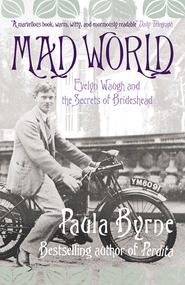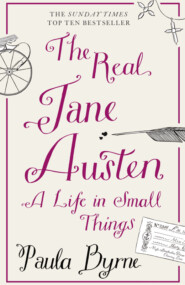По всем вопросам обращайтесь на: info@litportal.ru
(©) 2003-2024.
✖
Perdita: The Life of Mary Robinson
Настройки чтения
Размер шрифта
Высота строк
Поля
… I shall learn,
I trust I shall with meekness, and an heart
Unalter’d to my Prince, my Florizel. [leans on Florizel’s bosom]
(#litres_trial_promo)
On the final curtsy, the royal family returned a bow to the performers. Mary’s eyes met the Prince’s: ‘with a look that I never shall forget, he gently inclined his head a second time; I felt the compliment, and blushed my gratitude’.
(#litres_trial_promo)
Any doubt that he had been charmed by the lovely shepherdess in her simple dress and milkmaid’s red ribbons was dispelled as Mary was leaving the theatre: she met the royal family crossing the stage and ‘I was again honoured with a very marked and low bow from the Prince of Wales.’ One cannot help wondering whether she timed her departure from the green room in order to give herself the chance of bumping into the Prince. Since she was not appearing in that night’s afterpiece, Sheridan’s The Critic, she could have left the theatre much earlier. Instead, she waited backstage, chatting to her charming and well-connected new acquaintance Lord Malden: ‘He remarked the particular applause which the Prince had bestowed on my performance; said a thousand civil things; and detained me in conversation till the evening’s performance was concluded.’
(#litres_trial_promo) At home after the show, she threw a lavish supper party for her friends. It lasted far into the night and the handsome young Prince was the only topic of conversation.
During the previous six months, the Prince had regularly poured out his heart to Mary Hamilton, the sub-governess of his sisters the royal princesses. She was 23 to his 16 (he would always prefer older women). His letters to her, in which he called her Miranda and signed himself Palemon, survive in a private collection. Like a young man in a novel of sensibility, he threatened that he would commit suicide if she rejected him. She in turn threatened to resign her post if he did not stop pestering her, so he promised to address her ‘by the endearing names of friend and Sister, and no longer with the impetuous passion of a Lover urging his Suit’.
(#litres_trial_promo) But he still sent her gifts, such as a ‘Ring set with Brilliants’, which she returned on the very day of the command performance of The Winter’s Tale. He immediately penned a response in his favoured language of extreme sensibility: ‘I am astonished, I am surprised I am enchanted I am enchanted thou ever ever ever dearest, dearest, dearest cruel Creature, Oh believe me my Miranda that if ever I could love you more than I do this has done it. I am & ever shall be unto my last health Thy Palemon toujours de même.’ He also told her that he was looking forward to going to the theatre: ‘how happy should I be to see you there and agreeably entertained with me’.
(#litres_trial_promo) So the Prince went to the theatre that night full of thoughts of Mary Hamilton. By the end of the evening, he was ‘head in heels in love’ with Mary Robinson.
The unpublished letters to Miss Hamilton written by the Prince in the following few days tell the extraordinary story of the beginning of the relationship between the Prince and the actress from his point of view. It is a very different account from that in the Memoirs.
It must have come as something of a shock to Mary Hamilton at ten o’clock on Sunday morning to receive a letter in which, twenty-four hours after professing his undying passion for her, ‘Palemon’ announced that he had fallen in love with someone else:
I was delighted at the Play last Night, and was extremely moved by two scenes in it, especially as I was particularly interested in the appearance of the most beautiful Woman, that ever I beheld, who acted with such delicacy that she drew tears from my eyes, she perceived how much of my attention was taken up with her, not only during her acting but when she was behind the Scenes, and contrived every little innocent art to captivate a heart but too susceptible of receiving every impression she attempted to give it, and Alas my Miranda my friend, she did but too well succeed, consider what is almost impossible, and allow whate’r next to impossibility for the lively and strong and lively passions of a Young Man glowing with the utmost Warmth of desire, and yet feeling himself incapable of gratifying his darling. Her name is Robinson, on or off the stage for I have seen her both, she is I believe almost the greatest and most perfect beauty of her sex.
(#litres_trial_promo)
Whereas Mary’s account, written twenty years later, emphasizes the Prince’s gaze upon her, George’s, written the very next day, suggests that she was acting for him alone, both onstage and off, contriving ‘every little innocent art to captivate’ his heart. This letter also reveals the emotional power of her performance as Perdita: she was able to draw tears from the eyes of the young Prince.
The real surprise in this letter is the phrase ‘on or off the stage for I have seen her both’. In Mary’s account and in the subsequent myth of ‘Florizel and Perdita’, the command performance on 3 December 1779 was the first time the couple saw one another. But the Prince reveals here that he had seen her before, not only on the stage but also in society. Indeed, in the very next sentence he explains that ‘this passion has laid dormant in my bosom for some time, but last night has kindled it again to such a degree (for what can be more moving interesting, or aimiable [sic] than exquisite beauty in distress) that Heaven knows when it will be extinguished’. He had fallen for Mary Robinson some time before, but put her out of his mind until he saw her play the part of Perdita, the lost one, the ‘exquisite beauty in distress’. Already accustomed to projecting himself into dramatic roles (‘Palemon to Miranda’), George cannot help imagining himself as Prince Florizel.
‘Pardon me, pity me, comfort me,’ he writes to Miss Hamilton, ‘my heart is already something easier by having imparted to you my friend what I have not another friend I can strictly call so to whom I could with implicit confidence impart it.’ He knows that all his secrets will lie as secure in her bosom ‘as in the silent grave’, so she will ‘hear every thing relating to this affair’. He implores her not to reveal anything to the King and Queen. The letter ends with a postscript: ‘a[dieu] a[dieu] a[dieu] toujours chère. Oh! Mrs Robinson.’
Upon receiving this astonishing letter, Miss Hamilton sat down immediately to reply. Acknowledging that the subject embarrassed her, she endeavoured to express her sentiments:
Now my dear friend with respect to the present object of your passion and fancy – I know not what to say – let me however take the liberty of pointing out that a female in that line has too much trick and art not to be a very dangerous object – I do not reprove you for having fix’d your affections – for you tell me – beauty is amiable as well as interesting – how was it possible then for my young friend to steel his heart against the united forces of Beauty and innocence – when under (even of mock) appearance of distress – and likewise when that beauty and innocence could for his sake and to attract his regard, condescend to use the common little arts of her sex and profession to captivate a heart so much worth her while to conquer.
(#litres_trial_promo)
This Mary has no illusions about what the other Mary is up to: for her, an actress is synonymous with ‘trick and art’. In response to the Prince’s request for ‘comfort’, she says that he will not need it, since it will be a ‘pleasing certainty that the lady returns your love’. As for his statement that Heaven knows when his passion will be extinguished, she remarks that Heaven has nothing to do with the affair.
On the Tuesday morning, the Prince wrote again, signing himself, ‘Your unfortunate brother Palemon’: ‘I am in tolerably good health, tho’ over head in ears in love, and so much so that I do not know to what lengths it will carry me.’ The next day, he announced a plan of action:
My dearest friend does not seem to apprehend that the passion I have formed is for an Actress so that I scarcely dare flatter myself that she feels the same love for me that I do for her, I am convinced that she understood the language of my eyes and of my actions, from her manner and the tender and bewitching glances she gave me and her eyes said more than words can express. Heavens, was you but to see her, even if the most envious of her sex was to see her, they must confess that she is almost the most perfect beauty that ever was seen. However no more of these enthusiastic confessions or else you will take me to be mad, I know her to be very galant, and yet I can not help adoring her, however in a day or two I will inform you what opinion she has conceived of my person and how she is content with it, for I have an excellent person to employ who is well acquainted with her, who will inform me of these particulars and you may depend on my informing you immediately.
(#litres_trial_promo)
He had obviously been asking around on the subject of Mrs Robinson: ‘galant’ is code for her dubious reputation, but this has not put him off. He had established that she ‘lives totally separated from her husband’, which had the advantage that an affair would not disrupt ‘family peace’. He is, of course, aware that it would disturb the peace of the royal family, but he professed himself ‘blinded by passion’.
In response, Miss Hamilton warned him that it was already rumoured that he thought Mrs Robinson ‘a Divinity’ and that he should be wary of trusting anyone who would take on so infamous a role as that of a pander. Though the Prince did not reveal his go-between’s identity to Miss Hamilton, it was Lord Malden who paid Mrs Robinson a morning visit on his behalf.
On arriving in her drawing room, Malden seemed embarrassed and uncomfortable, even agitated. By Mary’s account, he ‘attempted to speak – paused, hesitated, apologized’. He was, he said, in a peculiarly delicate situation; he had something to deliver that he hoped she would not mention to anyone else. Finally, he produced a letter addressed to Perdita. She smiled a little sarcastically and opened it, finding it was a love letter. It contained only a few words, but ‘those expressive of more than common civility’. The signature was FLORIZEL. Mary continues the story in her favoured form of dramatic dialogue:
‘Well, my Lord, and what does this mean?’ said I, half angry.
‘Can you not guess the writer?’ said Lord Malden.
‘Perhaps yourself, my Lord,’ cried I, gravely.
‘Upon my honour, no,’ said the Viscount. ‘I should not have dared so to address you on so short an acquaintance.’
I pressed him to tell me from whom the letter came. – He again hesitated; he seemed confused, and sorry that he had undertaken to deliver it. ‘I hope that I shall not forfeit your good opinion,’ said he, ‘but—’
‘But what, my Lord?’
‘I could not refuse, – for the letter is from the Prince of Wales.’
(#litres_trial_promo)
Astonished, agitated, and sceptical, Mary ‘returned a formal and a doubtful answer’. Lord Malden then took his leave.
She read over the ‘short but expressive letter’ a thousand times. Malden returned the next evening to Mary’s house, where she was entertaining a card party of six or seven. He praised in extravagant terms the mind, manners, and temper of the Prince, while Mary’s ‘heart beat with conscious pride’ as she thought of ‘the partial but delicately respectful letter’ she had received the day before.
The Prince, meanwhile, was still keeping Miss Hamilton informed of developments. He told her that he was going to the theatre again, but this time to Covent Garden rather than Drury Lane – ‘Oh Mrs Robinson, Mrs Robinson, Mrs Robinson,’ he wailed.
(#litres_trial_promo) During the performance at Covent Garden, George appeared tired. A wag remarked that he would not have seemed so had he been at Drury Lane.
In his next letter he shared the news, which would hardly have been a surprise to Miss Hamilton, that there was every sign that his passion was reciprocated:
Know then my friend, that I am more than ever in love, and that the dear object of my passion, corresponds with my flame, and that our love is mutual, she was attacked the other [night] in the house for addressing every tender speech she ought to have addressed to Prince Florizel to me, you may see of what texture they are by reading them in Shakespeare.
(#litres_trial_promo)
Mary has, it seems, had to endure the embarrassment of heckling audience members accusing her of addressing her lines to the real Prince in the side box instead of the player prince, William Brereton, in the role of Florizel. (It is also worth remembering that Miss Hamilton would not have found all the lines in question in her Shakespeare, since some of Perdita’s ‘tender speeches’ had actually been written by Garrick.)
The Prince’s infatuation was the talk of the town. One night a friend of his sat next to Sir John Lade at Covent Garden. The Prince knew that Lade had ‘had an intimate connection avec mon aimable et chère séductrice’. Lade said that he had heard a great deal of the Prince’s attachment to Mrs Robinson and that he could give an assurance that she was as much pleased with him as he could be with her. The friend asked whether, in view of his own intimacy with Mrs Robinson, Lade felt ‘not undermined by this gallant young rival’. To which he replied, ‘By God I should be very glad of it for both their sakes as they seem so perfectly attached to each other.’ Having reported this to Miss Hamilton, the Prince signs off by regaling his long-suffering correspondent with a description of his ecstatic ‘metamorphosis’ from despondent victim of unrequited love to ‘gay galent Lothario’. ‘Love, passion, and the most ardent flame,’ he writes, are ‘boiling altogether in my bosom’.
‘For the love of Heaven, Stop, O stop my friend! and do not thus headlong plunge yourself into vice,’ Miss Hamilton responded. ‘Your last note and the preceding one made every nerve of me thrill with apprehension … You listen not to the voice of reason … I conjure you, strive to conquer this unhappy infatuation.’
(#litres_trial_promo) The letter continues for several pages in this vein, imploring the Prince not to become one of the ‘votaries of vice’. A fragmentary draft chides him for comparing himself to the archetypal rake – ‘Ah! boast not the title of a Lothario lest you should end with his fate’ – and also reveals that she has been doing her own research on Mrs Robinson:
My friend, you have been deceived, Mrs Robinson lives with her Husband and they have never been separated, – the young Baronet [i.e. Lade] if, he did boast, – boasted falsely. Her husband is young, Idle, and extravagant; and they have experienced distress, but her present occupation, as an actress, enables them to live perfectly to their taste, and at their ease – They have a little Girl about 4 or 5 years old – I know their whole History, which I got at by mere chance, and from what I think, the most undoubted authority – You have been abused by some designing person – take care that you are not drawn into some snare.
Вы ознакомились с фрагментом книги.
Приобретайте полный текст книги у нашего партнера:
Приобретайте полный текст книги у нашего партнера:











